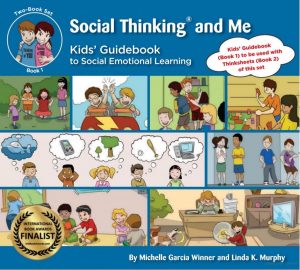Social Thinking and Me, Chapter 6: Hidden Rules and Expected Behaviour
Hello Everyone,
Today we finished going through Chapter 6, Thinking About the Hidden Rules and Expected Behaviour.
We started by brainstorming the unspoken rules that help everyone have a good experience and to feel safe in four different situations: a movie theatre, group work, in the library, and when we have a substitute teacher. As a group, the last one is particularly important.
The EXPECTED behaviour when a substitute or TTOC (Teacher Teaching on Call) is in the classroom, as brainstormed today by Div. 5, includes:
- Be welcoming,
- Follow the same rules as always,
- Follow the routine in the same way we would if Ms. D were here,
- Be helpful to the visiting teacher and others during the day,
- Staying on task and getting projects done,
- Staying with the group plan, and
- Communicate by raising our hands if we need to make a suggestion.
The UNEXPECTED behaviour when a substitute is here includes:
- Trying to trick the guest teacher or take advantage of the fact they are new and less familiar with the rules,
- Making fun of or laughing at the guest teacher,
- Not following the normal classroom or school rules, even if someone doesn’t tell you to follow them,
- Arguing with the guest teacher about what should be done, as sometimes things have to change temporarily when we have a guest,
- Interrupting all day during discussions without raising a hand, and
- Choosing to read, talk, or do other activities that are not part of the group plan.
At home, please try going over the EXPECTED and UNEXPECTED behaviour or HIDDEN RULES in a variety of situations, such as when you visit a park, during dinners at home, when you get ready for bed, or during a soccer game.
A recap of what we discussed in class, for you to review at home:
- It is important for me to figure out the hidden rules of any situation. The hidden rules help me to know what is expected behaviour.
- When I know what the hidden rules are, then I can behave in a way that is expected by everyone in the group. When I behave in the expected way, people will feel more safe, happy, and relaxed.
- When I use unexpected behaviour, I am not following the rules for a certain situation. Some of these hidden rules are things people are expected to understand. When I use unexpected behaviour, people may have negative feelings about me or the situation, such as feeling annoyed, confused, nervous, or worried.
- I can figure out what the expected behaviour in a situation is by thinking with my eyes, looking around to see what others are doing, or by asking for help to know what the hidden rules are.
Thank you for using this vocabulary of expected and unexpected behaviour at home. I keep reinforcing the ideas from the book in our daily conversations. It will help if these ideas are also reinforced as you have conversations at home, too.
Have a great week!

